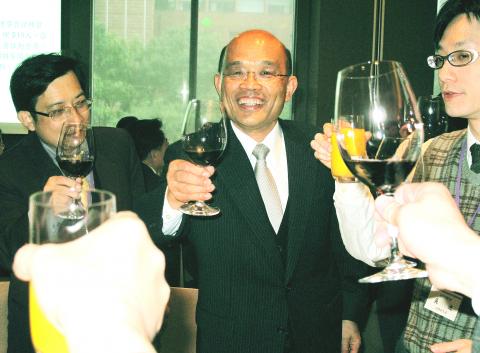Several Democratic Progressive Party (DPP) politicians continued to hint at a possible presidential run over the weekend, with only two months left before party primaries.
In one of his strongest signals yet, former premier Su Tseng-chang (蘇貞昌) said on Saturday he believed a presidential bid would fulfill his ideals, adding that “it is important that ideals are fulfilled every day.”
The 2008 DPP vice presidential nominee denied, however, that he had a timetable for the announcement, contrary to media reports that he could make a declaration on March 6, when his book and video tour ends.

Photo: Lin Shen-hsu, Taipei Times
Su traveled to shore up support in the south yesterday, after joining a local dental association for lunch. On Saturday, he went on a tour with conservation groups to protected wetlands in New Taipei City’s (新北市) Wugu District. Not more than two steps behind him, another former premier, Frank Hsieh (謝長廷), on Thursday said in a TV interview to be aired tonight that he was also “open” to the idea of a presidential bid, but said that DPP Chairperson Tsai Ing-wen (蔡英文) was currently a more popular candidate.
“Tsai’s poll ratings are currently higher,” he told Era TV. “If she doesn’t want to run, then [I’ll] consider it.”
While Tsai has not spoken publicly on her position on a presidential bid, she is understood to also be considering the idea, spurred on by grassroots supporters and senior party officials.
Yesterday she told a DPP event for the Tainan legislative by--elections that she was confident the DPP would “take back power” in the Presidential Office next year, after contending that the DPP has seen a resurgence since 2008, when she took the position of chairperson
The DPP plans to use telephone polls to settle the primaries, a controversial decision that has attracted opposition from many party supporters.

Taiwanese can file complaints with the Tourism Administration to report travel agencies if their activities caused termination of a person’s citizenship, Mainland Affairs Council Minister Chiu Chui-cheng (邱垂正) said yesterday, after a podcaster highlighted a case in which a person’s citizenship was canceled for receiving a single-use Chinese passport to enter Russia. The council is aware of incidents in which people who signed up through Chinese travel agencies for tours of Russia were told they could obtain Russian visas and fast-track border clearance, Chiu told reporters on the sidelines of an event in Taipei. However, the travel agencies actually applied

New measures aimed at making Taiwan more attractive to foreign professionals came into effect this month, the National Development Council said yesterday. Among the changes, international students at Taiwanese universities would be able to work in Taiwan without a work permit in the two years after they graduate, explainer materials provided by the council said. In addition, foreign nationals who graduated from one of the world’s top 200 universities within the past five years can also apply for a two-year open work permit. Previously, those graduates would have needed to apply for a work permit using point-based criteria or have a Taiwanese company

The Shilin District Prosecutors’ Office yesterday indicted two Taiwanese and issued a wanted notice for Pete Liu (劉作虎), founder of Shenzhen-based smartphone manufacturer OnePlus Technology Co (萬普拉斯科技), for allegedly contravening the Act Governing Relations Between the People of the Taiwan Area and the Mainland Area (臺灣地區與大陸地區人民關係條例) by poaching 70 engineers in Taiwan. Liu allegedly traveled to Taiwan at the end of 2014 and met with a Taiwanese man surnamed Lin (林) to discuss establishing a mobile software research and development (R&D) team in Taiwan, prosecutors said. Without approval from the government, Lin, following Liu’s instructions, recruited more than 70 software

Chinese spouse and influencer Guan Guan’s (關關) residency permit has been revoked for repeatedly posting pro-China videos that threaten national security, the National Immigration Agency confirmed today. Guan Guan has said many controversial statements in her videos posted to Douyin (抖音), including “the red flag will soon be painted all over Taiwan” and “Taiwan is an inseparable part of China,” and expressing hope for expedited reunification. The agency last year received multiple reports alleging that Guan Guan had advocated for armed reunification. After verifying the reports, the agency last month issued a notice requiring her to appear and explain her actions. Guan